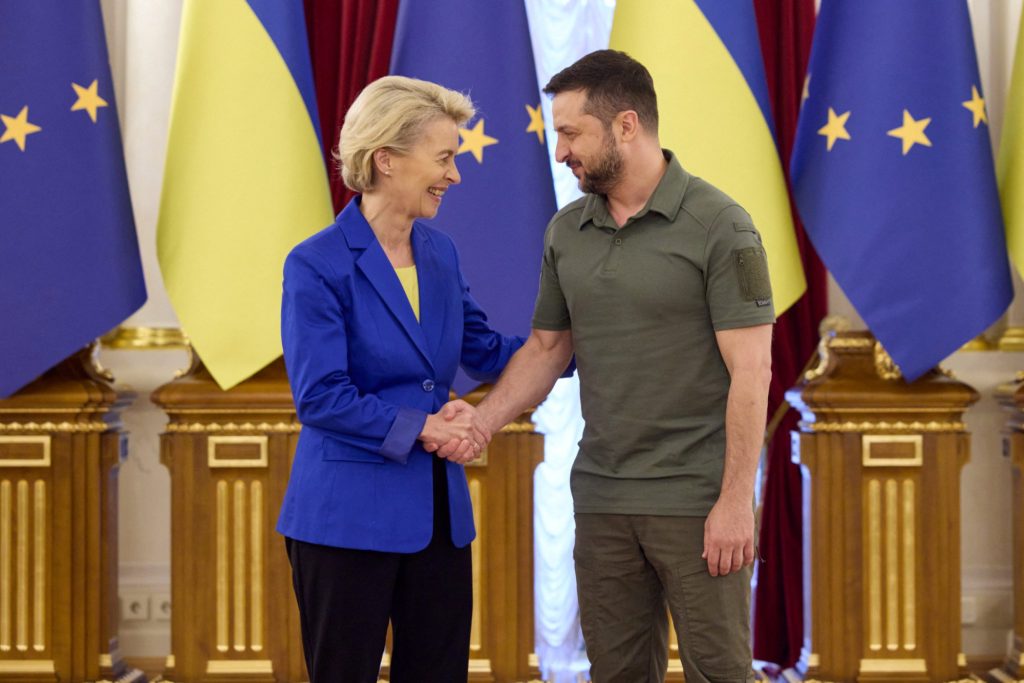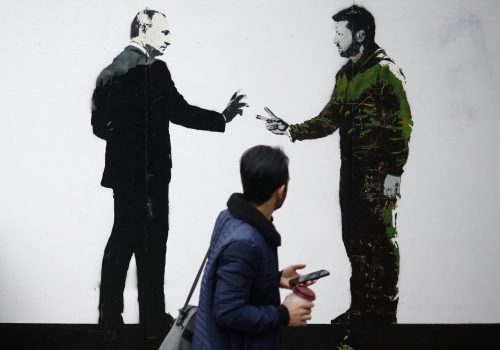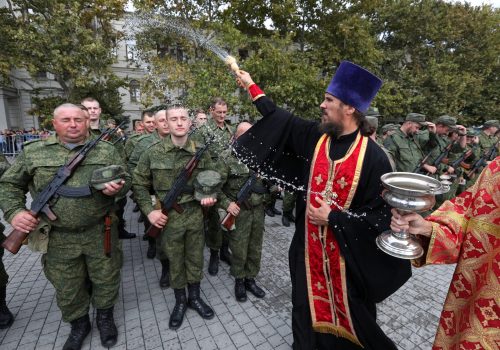The ongoing Russian invasion of Ukraine is already widely recognized as a watershed moment in modern European history. Clearly, the pre-war European security system is no longer viable and new approaches are required. As Ukrainian troops continue to liberate their country from Russian occupation, a consensus is emerging that the future stability of the continent will depend on Ukraine’s further integration into the European Union.
This integration process was already underway prior to the outbreak of hostilities in early 2022 but has been turbo-charged by Putin’s decision to launch the biggest European conflict since World War II. Ukraine’s deepening cooperation with the EU has a range of obvious advantages for Europe itself and could also prove beneficial for the United States.
Prior to the onset of Russia’s invasion on February 24, Ukraine appeared to have little prospect of achieving a breakthrough toward the country’s stated goal of eventual EU membership. However, the shock waves of Moscow’s brutal attack transformed the geopolitical situation and created a new reality that placed Ukraine’s relationship with the wider European community at the heart of the continent’s security strategy.
In the early days of the Russian invasion, President Zelenskyy signaled his intention to defy the Kremlin by officially applying for EU membership. This was an important gesture that helped to frame the war as a fight for independence against a resurgent Russia that refused to accept Ukraine’s departure from the Kremlin orbit.
While Moscow sought to crush Ukrainian statehood and reverse the verdict of 1991, Ukraine’s European aspirations symbolized the country’s resistance to Russian authoritarianism. This helped focus the minds of politicians across the continent. In June, Ukraine was duly granted official EU candidate nation status.
Stay updated
As the world watches the Russian invasion of Ukraine unfold, UkraineAlert delivers the best Atlantic Council expert insight and analysis on Ukraine twice a week directly to your inbox.
The intensification of Ukraine’s relationship with the EU has reshaped the wider geopolitical landscape in a number of ways. For example, with Ukraine and Moldova now both recognized as EU candidate nations, the existing Eastern Partnership format comprising Ukraine and Moldova together with Georgia, Belarus, Armenia, and Azerbaijan no longer makes sense. As a result, Brussels is in the process of rethinking the EU’s entire Neighborhood Policy for the region.
The changes currently taking place create the potential for a more stable European neighborhood in the post-war period. This would be welcomed in both Brussels and Washington DC. Ukraine’s former position in the geopolitical gray zone on Europe’s eastern flank left it vulnerable to Russian imperial interference and made the country a constant source of instability. Clarifying Ukraine’s status as a member of the Western world is in EU and US interests. In addition to reducing the scope for future Russian aggression, a fully integrated Ukraine can make a meaningful contribution to the EU’s own security and defense policy.
The EU and US also share common goals when it comes to the reform agenda in Ukraine. Both seek to strengthen the rule of law and establish capable Ukrainian institutions while consolidating the country’s democracy. US support for Ukraine’s further EU integration can serve as a powerful engine for these reforms.
Eurasia Center events

The reforms anticipated by the EU and US are very much in line with the vision of a European future embraced by the vast majority of Ukrainians. Polls conducted since the start of the Russian invasion consistently show overwhelming Ukrainian public support for European integration and EU membership. This creates historic opportunities for change that can be seized with the help of Ukraine’s Western partners.
The United States can support Ukraine’s European integration by cooperating closely with the EU to develop joint policies toward Ukrainian reforms that provide consistency and avoid any overlaps or loopholes. This approach should include a range of incentives and potential costs that will help keep reform efforts on track and prevent backsliding.
US officials can also play an important advocacy role in Europe promoting the benefits of closer cooperation with Ukraine. While the war unleashed by Vladimir Putin has transformed perceptions of Ukraine and its place in Europe, there remains significant skepticism within the EU on the issue of Ukrainian integration. The United States can help shape this evolving debate by emphasizing the advantages of an integrated Ukraine for transatlantic ties and European security.
As Ukraine seeks to move from candidate country status to EU member state, it may also make sense for the United States to tailor financial and technical aid in order to enhance this process and aid integration. Likewise, monitoring policies can also focus on the reform road map developed to bring the country closer to EU standards. This approach would bring welcome clarity to the role of Ukraine’s international partners in the country’s reform process.
Russia’s invasion of Ukraine is by far the greatest threat to Europe since the end of the Cold War. Unless Vladimir Putin is decisively defeated, the consequences for European security will be grave. However, if Ukraine is able to secure a military victory, it could pave the way for a new era of European stability and prosperity. This is clearly in the interests of all EU member states, and it is also an attractive prospect for the United States.
Dmytro Lyvch is an advisor to the Prime Minister of Ukraine, Chair of EasyBusiness NGO, and Co-Founder of the Centre for Economic Recovery. Yuliia Shaipova is a Ukrainian parliamentary advisor and Team Lead at the Centre for Economic Recovery.
Further reading
The views expressed in UkraineAlert are solely those of the authors and do not necessarily reflect the views of the Atlantic Council, its staff, or its supporters.

The Eurasia Center’s mission is to enhance transatlantic cooperation in promoting stability, democratic values and prosperity in Eurasia, from Eastern Europe and Turkey in the West to the Caucasus, Russia and Central Asia in the East.
Follow us on social media
and support our work
Image: Ukrainian President Volodymyr Zelenskyy and European Commission President Ursula von der Leyen shake hands in Kyiv. September 15, 2022. (REUTERS/Valentyn Ogirenko)




